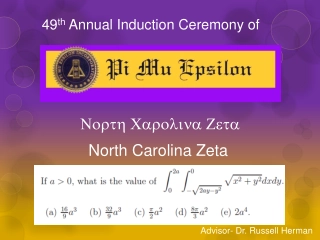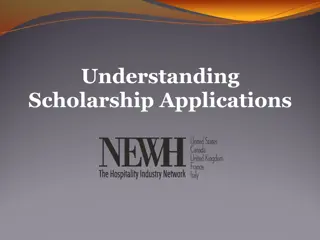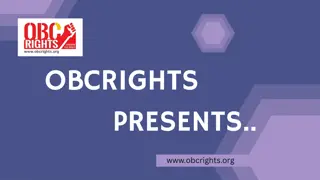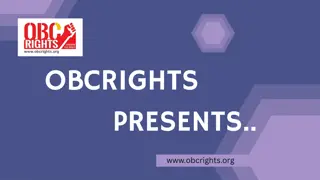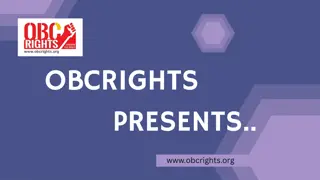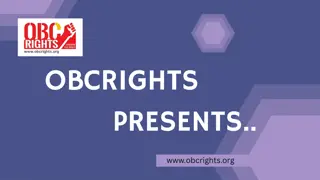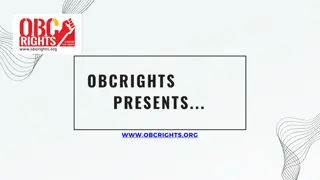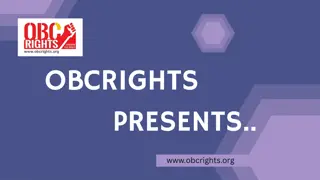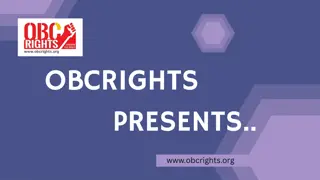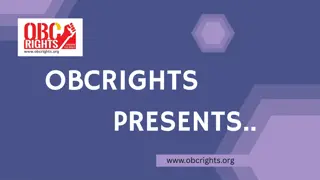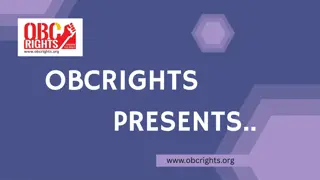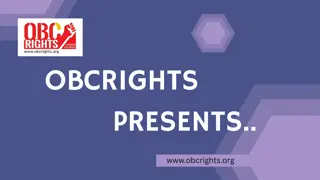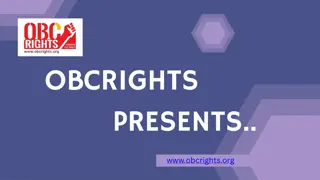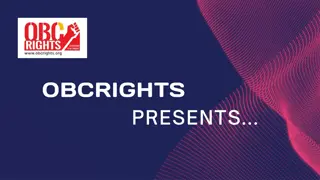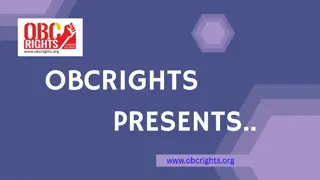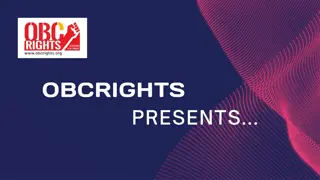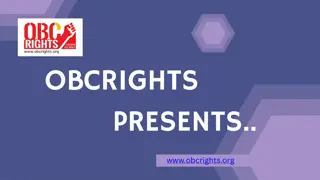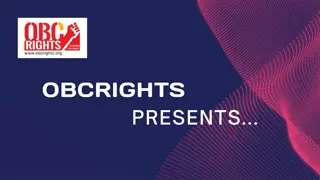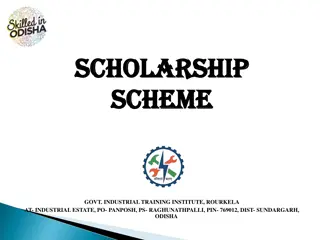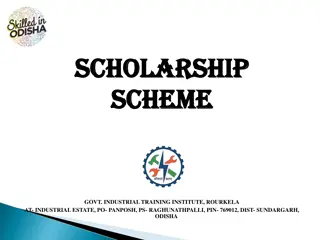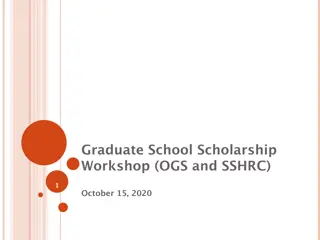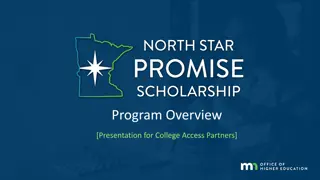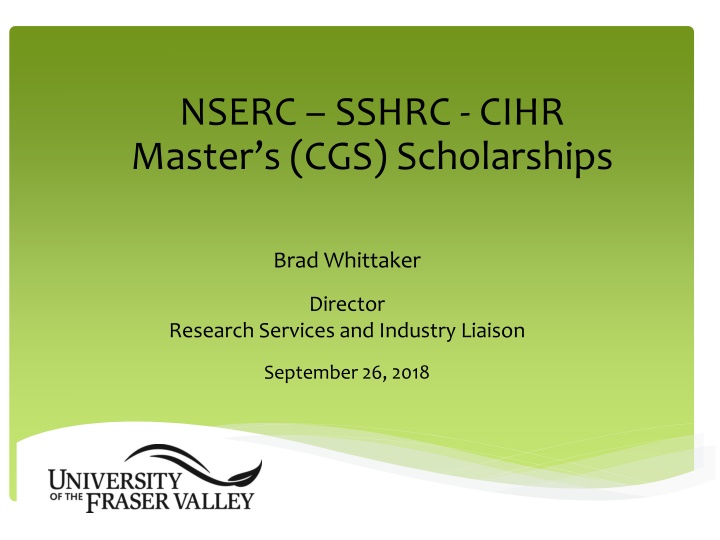
Master's Scholarships in Canada - NSERC, SSHRC, CIHR CGS
Explore the opportunities for Master's scholarships in Canada offered by NSERC, SSHRC, and CIHR through the CGS program. Learn about eligibility criteria, program of study requirements, and the objective of these scholarships to support high-achieving students in their research endeavors. Find out how to apply and enhance your research skills in graduate studies.
Download Presentation

Please find below an Image/Link to download the presentation.
The content on the website is provided AS IS for your information and personal use only. It may not be sold, licensed, or shared on other websites without obtaining consent from the author. If you encounter any issues during the download, it is possible that the publisher has removed the file from their server.
You are allowed to download the files provided on this website for personal or commercial use, subject to the condition that they are used lawfully. All files are the property of their respective owners.
The content on the website is provided AS IS for your information and personal use only. It may not be sold, licensed, or shared on other websites without obtaining consent from the author.
E N D
Presentation Transcript
NSERC SSHRC - CIHR Master s (CGS) Scholarships Brad Whittaker Director Research Services and Industry Liaison September 26, 2018
On One Condition You have to let Kelly Tracey in the Research Office know if you were successful and where you will be studying kelly.tracey@ufv.ca
Agenda Introductions Objectives Eligibility Selection Process / Selection Criteria The Application Approaches to consider
Introduction Your name, department, research area (past or current) scholarship you are applying for (NSERC / SSHRC / CIHR) graduate schools you will be applying to
Scholarships What is the main reason for applying for a Scholarship ?
Objective of the CGS to help develop research skills and assist in the training of highly qualified personnel by supporting students who demonstrate a high standard of achievement in undergraduate and early graduate studies.
Eligibilty be a Canadian citizen or a permanent resident of Canada be enrolled in, have applied for, or will apply for full-time admission to an eligible graduate program at the master s level at a Canadian institution with a CGS M allocation have achieved a first-class average, 3.67 A- at UFV, in each of the last two completed years of study (full-time equivalent); and submit a maximum of one CGS M application per year (the Research Portal will allow the application to be submitted to up to three institutions)
Program of Study Eligibility An eligible graduate program must have a significant research component: original, autonomous research that leads to the completion of a thesis, major research project, dissertation, scholarly publication, performance, recital and/or exhibit that is merit/expert-reviewed at the institutional level as a requirement for completion of the program. Master s programs that are based only on course work are typically not eligible since they do not include a significant research component
Deadlines Submission - December 1, 2018 Results April 1, 2019 Award - $17,500 for 12 months Acceptance / decline of offer 21 days after the offer Note: you will need transcripts from all undergraduate institutions this takes time http://www.nserc-crsng.gc.ca/Students-Etudiants/PG- CS/CGSM-BESCM_eng.asp
Selection Process The Faculty of Graduate Studies (or its equivalent) at each Canadian institution is responsible for coordinating the selection process for the CGS M applications, and for communicating the results to the applicants and agencies. The institution selection committees evaluate each CGS M application. Institutions could have more than one selection committee Tenable only at eligible Canadian Institutions
Allocations - Nationally Total awards: 2500 CIHR: 400 NSERC: 800 SSHRC: 1,300
Allocations Each eligible institution is assigned a separate allocation of awards to offer from each agency. For example: CIHR/NSERC/SSHRC UVIC: 62 - 6 / 18 / 38 SFU: 79 - 10 / 21 / 48 UBC: 201 - 40 / 75 / 86 TRU: 4 1 / 1 / 2 UFV: 1 May apply to a maximum of 3 different institutions connect with them now
Non Traditional Programs of Study Joint programs with a professional degree (e.g., MD/PhD, DVM/PhD, MBA/PhD, MA/MBA) are eligible if they have a demonstrated and significant research component as described above. Clinically-oriented programs of study, including clinical psychology are also eligible programs if they have a demonstrated and significant research component as described above.
Field of Research and Subject Matter Eligibility CIHR, NSERC and SSHRC support and promote high- quality research in a wide variety of disciplines and areas, which are divided into broad fields of research (health, natural sciences and engineering, and social sciences and humanities).
Completing the Application http://www.nserc-crsng.gc.ca/Students-Etudiants/PG- CS/CGSM-BESCM_eng.asp Go to the Research Portal, Sign in Click on Create Applications Select CGS M Program Click on Create Note: Instructions
Research Portal Where you complete the application Need to create an account Attachments are pdfs Look at instructions & selection criteria while writing
Proposed Host Institution You must indicate the institution at which you intend to hold the award. You can select up to three institutions; however, you may select only institutions where: you will apply for full-time admission to an eligible program of study by the deadline set for your intended graduate program or by March 15, whichever comes first. Any institution may only be selected once. Only one department per institution may be selected.
Summary of Proposal Provide a summary of your project in a language that the public can understand. This plain language summary will be available to the public if your application is successful
Outline of Proposed Research Maximum two pages: a maximum of one page can be used for the outline of proposed research; and a maximum of one page can be used for bibliography/citations.
Outline of Proposed Research Provide a detailed description of your proposed research project for the period during which you will hold the award. Be as specific as possible. Provide background information to position your proposed research within the context of the current knowledge in the field.
Outline of Proposed Research State the objectives and hypothesis, Outline the experimental or theoretical approach to be taken (citing literature pertinent to the proposal), and the methods and procedures to be used State the significance of the proposed research to a field or fields in the health sciences, natural sciences and/or engineering or social sciences and/or humanities, as appropriate.
Outline of Proposed Research Applicants are expected to write their own outline of proposed research independently. Ideas and/or text belonging to others are to be properly referenced. Include all relevant information in the outline. Do not refer reviewers to URLs or other publications for supplemental information. In the Outline of Proposed Research, provide the requested information according to the guidelines and format standards outlined in the Presentation Standards.
Presentation Standards Text must be single-spaced, with no more than six lines per inch. The acceptable font is Times New Roman (regular, minimum 12- pt.) or a comparable serif font. Condensed type is not acceptable. Set margins at a minimum of 2 cm (3/4 of an inch) all around. Use a left-justified, standard page layout. Include your name in the page header (on every page). For multipage attachments, number the pages sequentially. The maximum number of pages permitted is indicated in each section of the application. Pages in excess of the number permitted will be removed
For SSHRC only If the output of your degree program is an artistic creation rather than a thesis, indicate clearly the research component of your proposed work. Outline the objectives of your research, the context, methodology, and contribution to the advancement of knowledge; If your degree program does not involve a thesis, major research paper/essay, or a major research project, remember to outline clearly the research component of the degree.
Transcripts Need to attach transcripts by scanning and uploading Include the back side legend Keep paper copies Order transcripts now This term s transcript will not be included
Canadian Common CV Needs to be completed can be difficult and time consuming The CGS M CCV template was designed to cover the breadth of candidates to the program. Certain fields of entry in the template may not be applicable to your specific circumstances. In those instances, the sections should be left blank.
Selection Criteria Keep in front of you when applying Academic Excellence - 50% As demonstrated by past academic results, transcripts, awards and distinctions. Research Potential - 30% As demonstrated by the applicant s research history, his/her interest in discovery, the proposed research, its potential contribution to the advancement of knowledge in the field, and any anticipated outcomes Personal Characteristics and Interpersonal Skills 20% As demonstrated by the applicant s past professional and relevant extracurricular interactions and collaborations.
Academic Excellence - Indicators Academic record (first class average) Scholarships and awards held Duration of previous studies Type of program and courses pursued Course load Relative standing (if available)
Research Potential - Indicators Quality and originality of contributions to research and development Relevance of work experience and academic training to field of proposed research Significance, feasibility and merit of proposed research Judgment and ability to think critically Ability to apply skills and knowledge Initiative, autonomy and independence Research experience and achievements relative to expectations of someone with the candidate s academic experience
Personal Characteristics and Interpersonal Skills - Indicators Work experience Leadership experience Project management including organizing conferences and meetings The ability or potential to communicate theoretical, technical and/or scientific concepts clearly and logically in written and oral formats Involvement in academic life Volunteerism/community outreach
Application 1/ Canadian Common CV 2/ Outline of Proposed Research (one page) 3/ Bibliography / citations (one page) 4/ References (two) 5/ Transcripts (scanned)
Writing Your Proposal Applicants are expected to write their own outline of proposed research independently. Ideas and/or text belonging to others must be properly referenced. Include all relevant information in the outline. Do not refer reviewers to URLs or other publications for supplemental information. In the Outline of Proposed Research, provide the requested information according to the guidelines and format standards outlined in the Presentation Standards.
References - Assessments Each application must be accompanied by two reference assessments. These must be completed by persons capable of making an informed assessment, and they cannot be completed by a proposed supervisor unless that person is, or has been, your supervisor You must contact your proposed references to ensure they are willing to complete an assessment for you.
References - Assessments One assessment should be from a person familiar with your research and other abilities, e.g., current academic research supervisor or industrial supervisor (in the case of co-op students), previous academic research supervisor or industrial supervisor. The second assessment should be from a person sufficiently familiar with your research and other abilities to provide a meaningful commentary. Ask them to be very specific
Agenda Grant Writing A Science & Introductions: name, department, research title/project (briefly) Approach to Research Grant Writing Writing the project summary: purpose and goal statement Details of the project: objectives, outcomes, design, schedule, dissemination, submission of results An Art
Perspective Writer vs Reader
Kiplings Six What Why Who How Where When
Source of Kiplings Six The Elephant s Child I keep six honest serving-men (They taught me all I knew); Their names are What and Why and When And How and Where and Who. I send them over land and sea, I send them east and west; But after they have worked for me, I give them all a rest.
Kiplings Six What objectives Why making a compelling case in academic and non academic worlds How methodology Who you Where environment research will take place When research schedule
Keep in Mind Avoid jargon and acronyms Make it readable Make it make sense Follow a narrative Follow the format requested
Contact Brad Whittaker 604-557-4044 brad.whittaker@ufv.ca Greg Schlitt greg.schlitt@ufv.ca Kelly Tracey kelly.tracey@ufv.ca
Thank you and GOOD LUCK!

